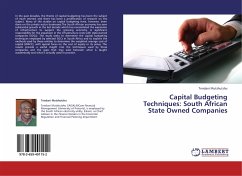In the past decades, the theme of capital budgeting has been the subject of much interest and there has been a proliferation of research on the subject. Many of the studies on capital budgeting have, however, been done on the private sector businesses.The South African economy has seen substantial growth in the last decade which has necessitated the expansion of infrastructure to support the growing economy. A significant responsibility for the expansion in the infrastructure rests with state-owned companies (SOCs). The study seeks to determine the capital budgeting techniques employed by selected SOCs in South Africa and to explore the methods used by these entities to determine the weighted average cost of capital (WACC), with special focus on the cost of equity or its proxy. The results provide a useful insight into the techniques used by these companies and the gaps that may exist between what is taught academically and what is actually used in practice.
Bitte wählen Sie Ihr Anliegen aus.
Rechnungen
Retourenschein anfordern
Bestellstatus
Storno

